New Life Prayer Centre and Church founder, Apostle Ezekiel Odero, is facing intense public backlash after making controversial claims about the Diani plane crash that killed 11 tourists on Tuesday, October 28.
Speaking during a church service on Thursday, October 30, Odero claimed that he was supposed to board the same aircraft but changed his plans after receiving a “divine warning.” His statement has ignited outrage among Kenyans who accuse him of exploiting tragedy to gain publicity and manipulate followers’ emotions.
The Kilifi-based preacher narrated how he allegedly avoided death by switching from air travel to the train from Mombasa to Nairobi, following what he described as a prophetic revelation.

Pastor Ezekiel Odero Claims Divine Intervention Saved Him
During the live service, Pastor Ezekiel recounted how he had planned to travel from Mombasa to Nairobi using the same plane that later crashed in Diani, Kwale County. He claimed he felt a strong spiritual message cautioning him and his wife, Sarah Odero, against taking the flight.
“I can tell you that I had planned to use the aircraft that crashed in Diani recently. I had booked tickets to travel to Nairobi on the same day, but I decided to board a train because I knew I was going to die,” he told his congregation.
He went on to claim that while praying in Kilifi the night before, he told his wife they would die if they boarded the flight. “I warned her that if we use the aircraft, we would not arrive alive. I told her that there would be breaking news about my death if we used that aircraft,” he added.
According to Odero, his wife followed his instructions, and they instead boarded the Standard Gauge Railway (SGR) train to Nairobi. He even claimed to have proof that he did not use the air tickets.
However, Kenyans online were quick to point out that his narrative did not add up.
Kenyans Expose Inconsistencies in Ezekiel Odero’s Story
Sharp-eyed Kenyans noted that Pastor Ezekiel’s account was full of factual contradictions. The ill-fated aircraft was flying from Diani in Kwale County to the Maasai Mara in Narok County, not from Mombasa to Nairobi as Odero claimed.
His alleged “divine revelation” about a different route and timing raised serious doubts about his credibility. Many wondered why a supposed prophet who foresaw the crash did not intercede to prevent it or warn others.
“His narration seems wrong since the aircraft was travelling to Maasai Mara and not Nairobi,” one user wrote on social media. Another commented, “If he knew about it, why didn’t he pray for the passengers’ safety?”
Critics also accused the televangelist of capitalizing on the tragedy for attention. “It’s insensitive to use a fatal accident for self-promotion,” a Kenyan posted. “He should focus on comforting the victims’ families instead of crafting supernatural stories.”
Public Calls for Accountability and Sensitivity
The backlash against Pastor Ezekiel Odero reflects growing frustration over religious leaders who use emotional manipulation to maintain control over followers. Many Kenyans have demanded that the government and the Kenya Film Classification Board (KFCB) monitor such public religious statements more closely.
“The line between faith and exploitation is becoming dangerously thin,” one commentator noted. “We can’t keep allowing pastors to make unverifiable claims about tragedies just to appear powerful.”
Others questioned the silence of authorities despite the growing public concern. “If any other person made such a claim about a national tragedy, they’d be investigated. Why is it different when it’s a preacher?” another Kenyan asked.
The criticism is part of a broader debate over the accountability of high-profile televangelists in Kenya. Pastor Ezekiel has previously faced scrutiny from government agencies following the controversial Shakahola cult investigations, where he was linked to Pastor Paul Mackenzie’s Good News International Church.
Although Odero denied any involvement, the Diani plane crash remarks have once again placed him at the center of public controversy.

Faith, Fear, and the Power of Influence
Ezekiel Odero’s latest claims have reignited discussions on how spiritual influence can blur lines between faith and manipulation. While millions across Kenya follow him for his sermons and “miracle services,” critics argue that unchecked influence can mislead vulnerable believers.
For grieving families of the 11 victims, his words were deeply hurtful. “This is not a time for stories of divine warnings,” a relative of one of the victims said. “People lost their lives. Families are mourning. It’s not a show.”
Despite the public backlash, Odero has not issued any clarification or apology. His followers continue to defend him, calling the criticism a spiritual attack. However, the general public remains unconvinced, demanding greater transparency and sensitivity from religious leaders in times of tragedy.
Whether or not Pastor Ezekiel Odero truly foresaw the accident, the backlash has underscored Kenya’s deepening tension between faith, truth, and accountability in the modern religious space.











































